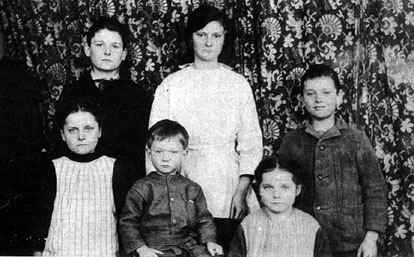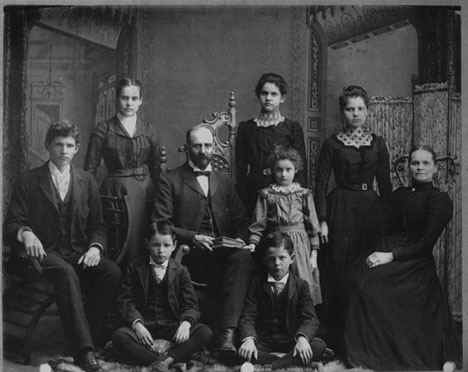The Scattering
In the mid-winter of 1920, just days before Mr. Sandford received the message "Work", the probate court of Androscoggin County handed down a decree that had a lasting and telling impact on Frank Sandford's Holy Ghost and Us movement. The following articles appeared in the Lewiston papers during this period of time, describing the conditions at Shiloh in the last days of her communal existence, signaling the beginning of her final self -implosion.
From this website
timeline:
3- 9-1920 Mr. S says God told him, "Work," and "can work," in regard to Shiloh
residents leaving to find work. By May all but 100 of the residents have moved out. This is referred to as the Scattering. This date is
from Doris Hastings' diary.
 |
The William Hastings children, on the day of their mother's
death (Elma Beane Hastings) 1-15-1920. Back row: David 11, Mary 15, Marshall 9 front row Elma 7, Almon 3, Eva 5 Older brothers Ford & Solomon, not present, had run away back to Canada. photo by Silvius, copy from Floyd Hastings |
 |
The Beane family, from Kitchener, Ontario, Canada back row l to r: Ivan, Elma, Henry, Selina, Edith, & Eva (Hallman) front row: Melvin, Elden, Mary, & Anna |
Lewiston Evening Journal February 28,
1920
Judge Newell Gives Hastings Children to Uncle, Melvin Bean
Court Decree Sustains Contentions of Those Who Held That
They Were Not Properly Cared for at Shiloh
Judge Newell of the Androscoggin County Probate Court in a decision rendered Saturday
morning, gives into the custody of their uncle, Melvin H. Bean of Linwood, Ontario, the
minor children of William Alfred Hastings of the Shiloh colony at Durham.
Thus ends - unless the father should appeal, as is his legal right - a case that brought
out much strikingly sensational testimony. The contentions of the uncle - the dead
mother’s brother - were that the conditions in the Shiloh colony were not fitted to
the upbringing of minor children, is sustained by Judge Newell. Emphasis is laid upon the
fact that the best interest of the children is the paramount consideration - and it is
proper to take into account not only their temporary welfare, but the training which will
tend to their final development.
It is understood that Judge Newell is personally acquainted with the witnesses introduced
by Mr. Bean, and therefore was convinced that they spoke the truth.
The Decree
STATE OF MAINE
Androscoggin, ss.
At a Probate Court held at Auburn, within and for said County, on the twenty-seventh day
of February, 1920, by adjournment from day to day, from February 4, 1920.
At the hearing, the petitioner was present in person, and represented by his counsel, Hon.
F. A. Morey; the father, William Alfred Hastings was present in person and represented by
counsel H. E. Coolidge, Esq.
After a full hearing relative to the conditions surrounding the minors, a guardian for
whom the petition is
( ... article contents illegible... )
from other witnesses produced at the hearing, that the welfare of said minors demands the
appointment of a suitable person as guardian, not only for the preservation of whatever
property they may have, but for the care and custody of their persons as well.
I regard it as a settled principle of law that in the appointment of a guardian for a
minor, the best interests for the one for whom the petition is presented is the paramount
consideration, and that it is proper and imperative to take into account not only the
temporary welfare but, among other things, the training which the minor is to receive,
tending to his final development into a good citizen.
I find the conditions surrounding said minors are not what they should be, in that it
appeared to me, in that it appeared to me that they did not receive proper or sufficient
food: and further, that the training received from the father, who is the surviving
parent, is not such as would tend to develop said minors into self-supporting members of
society and good citizens.
It is decreed, that Melvin H. Bean of Linwood Ontario be appointed guardian of said
minors. David Hastings, Marshall Hastings, Elma Hastings, Eva Hastings, and Almon Hastings
with the care of the persons and the education of said minors; and that Letters of
Guardianship issue to him, he first giving bond, with sufficient sureties in the sum of
fifteen hundred dollars.
WILLIAM H. NEWELL
Judge of Probate
Lewiston Evening Journal March 5, 1920
Children Famished Horses Worked to Bone, Shiloh Report
Children's Protective Society General Secretary of Portland Makes Formal Complaint
A thrilling story of starving children and horses worked to the bone was told today to the
Express by Mrs. Maud William Smith, general secretary of the Children’s Protective
Society, who has lodged a formal complaint with the agent representing the State Board of
Children’s Guardians in the Shiloh district.
Mrs. Smith visited Sandford’s colony only yesterday, and describing her trip as most
exciting. for two miles and a half her ride to the vicinity of Shiloh was over high
snowdrifts and through roads where only the second story windows of the houses were
visible, and so uncertain was the traveling that she was obliged to keep changing her
position in the sleigh from one side to the other in order to avoid tumbling from the
vehicle. Once the neighborhood was reached Mrs. Smith heard stories that seemed to verify
reports that have recently gone out against the colony on the hilltop.
Mrs. Smith says that neighbors in that vicinity report that the two children, Just Miller
and Benjamin Miller, concerning whom the papers have recently published stories, and that
they are undersized, and are going from house to house obtaining food. Neighbors say that
these children are given soggy biscuits made from what is called “middlings”,
very heavy and unpalatable. “I did not see either children,” said Mrs. Smith,
“but I did see one of these biscuits and the people whom I interviewed say that these
children appear to be actually starving, that they eat like little famished animals, and
that they tell that they are allowed one biscuit in the morning and one at night, and
occasionally three each day. “I talked with people,” continued Mrs. Smith,
“in whom I have great confidence, and these people tell me that the horses at Shiloh
are worked down because it is necessary; that they be driven four or five miles a day
through very deep snow and that the feeling among the neighbors is that the cows are
receiving no grain and are also in a serious condition.”
Another matter that is worrying the neighbors in that vicinity is the fear that these two
children are not receiving schooling as it is said that they are not allowed to go to the
Shiloh school because they are not “spiritually fit”. The neighbors also report
that a conservative estimate of the number of children at Shiloh is about fifty. The
Shilohites themselves, it is said, claim about 500 souls, but Mrs. Smith was informed
yesterday that the census gives the number at about 350.
Mrs. Smith’s complaint to the State was lodged with the agent representing the State
Board of Children’s Guardians in the Shiloh district, and she said this morning,
“While I did not visit the hilltop, I have every reason to believe that the
information I received is true; the people with whom I talked were fine appearing, steady,
intelligent men and women, who are interested in the welfare of their community. They did
not talk for the sake of gossiping, nor is there any spirit of malice or revenge. They do
feel, however, that this condition existing at Shiloh is something that must be remedied
and that it is a matter that should not be allowed to rest until something is done to see
that the children at that institution are at least properly nourished and properly
educated.”
Mrs. Smith left Portland in the morning, returning at five last night.
Mrs. Smith says that these neighbors state that the children in the vicinity of Shiloh are
not allowed to talk to these two children, Just and Benjamin Miller, the conclusion by
those who heard the story being that if they are not “spiritually fit” to go to
school with the Shiloh children and the children in the village are not allowed to speak
to them, they must lead very lonely lives aside from the physical discomfort of being
hungry.
Lewiston Evening Journal May 13, 1920
Holy Ghost and Us Bible School has its Last Session
End of Shiloh as Institution Appears Near
John Baptist Now Is Working in Dye House
(Special to the Press) Durham, May 12, The end of Shiloh as an institution appears to
outsiders to be near at hand, if indeed it has not already arrived.
Realizing at last the full significance of a scriptural passage they have ignored to a
large extent in the past - that man must earn his bread by the sweat of his brow - John
the Baptist, son of the Rev. Frank W. Sandford, long leader of the colony, and several
others prominent in affairs on the hilltop have gone to work.
No longer do they resort to prayer for their sustenance and raiment, and it is understood
that the people living on farms owned by the Kingdom, so called, are to turn in one-tenth
of their receipts for improvements and support of their animals.
Other changes have also taken place, but the climax came tonight, when the Bible School of
the Holy Ghost and Us Society was called together for the last time. Less than thirty
persons were present, whereas in the balmy days more than 600 would assemble. It was
definitely decided to hold no more meetings.
The Rev. Willard Gleason, one of Elijah’s former right hand men, is in Boston, where
he has a job in a garage. John the Baptist, who resigned while his
father was serving a sentence in the Federal penitentiary in Atlanta* for manslaughter is working in the dye
house of the Worumbo woolen mills at Lisbon Falls, and it is said that his position is the
least desirable of any in the plant. N. G. Brown, who married Sandford’s sister and
was for many years Shiloh’s postmaster has given up his government position and has
also obtained employment in the dye house.
Capt. Everett Knight, Brown’s stepson and commander of one of the Shiloh yachts is
today busily engaged in leading a horse that hauls one of the shovels used in excavating
the new mill at Lisbon Falls, and Mrs. Brown is acting as postmaster. Only two mails a day
are received now.
The Bethesda Hospital at Shiloh which was fitted up at great cost, $50 each being paid for
some of the chairs, is to be permanently closed as soon as the two patients there have
been removed. One of them is a colored girl, and it is reported that the State has been
asked to care for her.
* We are not entirely sure of the veracity of this statement,
although in the a letter to John Sandford from his good friend Doris White Hastings, there
is mention made of John's period of time when he "doubted".
At the very least, John did procure work after the "work
and can work" announcement. He and his wife took up residence during the 1920s
in South Portland, but his attentions ultimately returned to Shiloh, and in the
1930's was largely responsible for a "mini-revival" among those families still
living in the community. [Ed.]